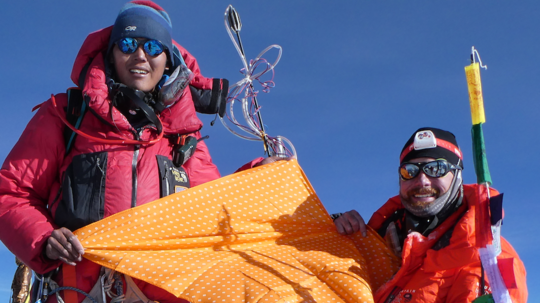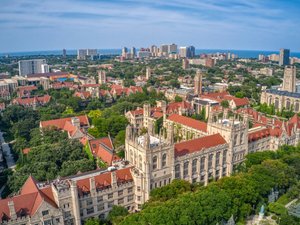
When Erik Severinghaus decided to take an executive position at SpringCM, a Chicago-based sales contract management software startup, he told his then potential boss that he’d take the job only if he’d have time to complete a goal of his—climb Mount Everest.
Dan Dal Degan, the CEO of SpringCM, agreed, telling Severinghaus he could have all the time he needed to train and travel to Nepal to climb the tallest mountain in the world.
“Dan looked at me and said, ‘If you’re going to climb Mount Everest—if you’re serious about that—I will support that 100 percent,’” Severinghaus said.
So in March 2017, Severinghaus joined SpringCM as its chief strategy officer and global head of alliances. And a year later on March 19, left Chicago for Nepal, where he endured a nine-week voyage that culminated in a five-minute view from the top of the world.
“I wanted to figure out what my limits were,” Severinghaus said. “I don’t think we as humans very often get to truly figure out what we’re made of.”
But climbing to the top of Mount Everest was a long-time coming. He had been training for that hike after seeing the mountain for the first time nearly a decade ago, but just hadn’t found the time to climb it.
Before working at SpringCM, Severinghaus was the CEO of SimpleRelevance, a local startup he founded in 2012 that made a machine-learning platform for digital marketing. The startup competed in the first class of Techstars Chicago in 2013, was one of the first to work out of local tech and startup incubator 1871, and raised $2.5 million in venture capital funding from investors like Hyde Park Angels and Chicago Ventures.
All the while, though, Severinghaus was still itching to climb Mount Everest.
“A lot of my climbing got put on the back burner because I was really focused on building this startup,” he said. “It was something that frustrated me. I had to cancel a lot of trips I wanted to take because fundraising would go longer than I wanted it to.”
So when SimpleRelevance was acquired by Chicago-based digital marketing agency Rise Interactive in 2015, it finally gave Severinghaus the freedom he needed to focus on climbing Everest.
“When I sold SimpleRelevance to Rise, what was a big focus for me was how can I get more balance back into my life, so I don’t feel like I’m putting everything into this one part,” Severinghaus said. “Being a technology entrepreneur is a key part of my life, but I don’t want it to be the entire thing.”
But with his new position at SpringCM and the understanding from his boss, Severinghaus was able to focus on making his dream happen.
"I wanted to figure out what my limits were."
Mount Everest is more than 29,000 feet high. For context, the tallest mountains in Colorado are only 14,000 feet tall. About 600 people climb to the top of Mount Everest each year and more than 4,000 have scaled the mountain since Sir Edmund Hilary and Sherpa Tenzing Norgay first made it to the top in 1953.
The climb, on average, lasts roughly two months, with the trek to base camp alone taking about 10 days. And while more people are climbing Everest every year, it’s still incredibly dangerous, with over 280 deaths occurring on the mountain since Hilary and Norgay's first ascent.
It's also a very expensive endeavor. Severinghaus said he spent $75,000 on the trip.
He began the climb optimistic, but during the second phase of it, when the elements, like low oxygen levels and subfreezing temperatures, began to wear on him, he thought he wouldn’t make it.
“I got up there and I was miserable,” he said. “It’s so high in the air. It was impossible to breathe. I felt sick. I didn’t sleep well. I just wanted to go home.”
Severinghaus told the climbing guide he couldn’t make it to the top and needed to turn back. However, the guide urged him not to, explaining that he wasn’t performing any worse than others who had eventually made it to the top.
“This reminded me a lot of the challenges I had with technology entrepreneurship,” Severinghaus said. “One thing that I’ve learned during my journey as an entrepreneur is that a lot of times, entrepreneurs personalize that struggle. That grind just wears you down to the point that you look in the mirror and say, ‘I don’t have it. This is too hard. I just need to give up.’”
But he kept climbing the mountain, and on summit day, made it to the top, where he flew two flags that represented communities close to his heart. One was the SpringCM flag and the other was the Chicago Cubs W flag.
“I took it up as my good luck charm,” he said, referring to the Cubs flag.
In the group of about 30 people that climbed Everest with Severinghaus, only 13 made it to the top. Some dropped out on the final climb, but many others had turned back weeks before.
And though Severinghaus made it to the top, he didn’t do so unscathed. He has suffered from some nerve damage in his back since the climb, which he says he’s now working through in physical therapy.
When it was all over, Severinghaus returned to Chicago at about 9 a.m. on May 25. He was greeted by his friends and family, who surprised him with an opportunity that amplified the ending to his already surreal journey. They took him straight from the airport to Wrigley Field, where he threw the first pitch of the day's baseball game.
“Tom Ricketts had heard about what I was doing, and he’d seen the picture of me on top of Everest with the W flag,” he said. “I was literally living my dream life. I wanted to pinch myself.”
Severinghaus has since returned to reality, working daily at SpringCM. He just helped the company sign on its latest client, oil and gas company Shell, which has been added to the list of other major corporations, like Salesforce, DocuSign and Adobe, that work with the tech company.
Since he’s gotten climbing Mount Everest out of his system, Severinghaus said he’s been able to better concentrate on his work, adding that the climb has made him a better employee.
“Mount Everest really helped me be present and focus,” Severinghaus said. “I got to think longer thoughts and be less focused on the dopamine hits that we get from constantly being interrupted.”
When asked if he’d ever climb Mount Everest again, Severinghaus immediately said no, but followed it up with a “maybe.” Following the acquisition of SimpleRelevance, he never saw himself starting another tech company. But he’s since adjusted his outlook on that, so he says it's possible he might eventually change it on Everest.
“I wouldn’t have gone on this experience if I didn’t expect it to change my life,” he said. “And I really do think that it did.”








